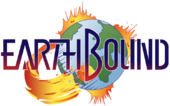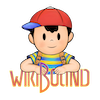| Site Notice |
|---|
|
We have a limited coverage policy. Please check our coverage page to see which articles are allowed. |
Difference between revisions of "EarthBound series"
Torchickens (talk | contribs) (→Games) |
(→Games) |
||
| (2 intermediate revisions by one other user not shown) | |||
| Line 14: | Line 14: | ||
|latest=''[[Mother 3]]'' | |latest=''[[Mother 3]]'' | ||
|latestyear=2006 | |latestyear=2006 | ||
| − | | | + | |niwa_table=true |
| + | |english={{Wiki-logo|WikiBound|size=100px}} | ||
| + | |italian={{Wiki-logo|WikiBound (Italian)|size=100px}} | ||
}} | }} | ||
'''''EarthBound''''' (Also referred to as '''''MOTHER''''', the series' Japanese name) is a series of role-playing games created by producer [[Shigesato Itoi]]. Unlike most RPGs, these games are notable for their unusual sense of humor, the setting (similar to the 20th century United States), and main characters (generally a group of children). While a popular franchise in Japan, ''EarthBound'' failed to find success worldwide, instead attracting a cult following. | '''''EarthBound''''' (Also referred to as '''''MOTHER''''', the series' Japanese name) is a series of role-playing games created by producer [[Shigesato Itoi]]. Unlike most RPGs, these games are notable for their unusual sense of humor, the setting (similar to the 20th century United States), and main characters (generally a group of children). While a popular franchise in Japan, ''EarthBound'' failed to find success worldwide, instead attracting a cult following. | ||
| Line 36: | Line 38: | ||
{{GameList/header|colorscheme=EarthBound}} | {{GameList/header|colorscheme=EarthBound}} | ||
{{GameList/section|colorscheme=EarthBound|section_title=Main games}} | {{GameList/section|colorscheme=EarthBound|section_title=Main games}} | ||
| − | {{GameList/cell| | + | {{GameList/cell|''[[EarthBound Beginnings]]''|1989|2015|2015|2015|N/A|[[Nintendo Entertainment System]]}} |
| − | {{GameList/cell|{{ga|EarthBound}}|1994|1995|2013|2014|N/A|[[Super Nintendo]]}} | + | {{GameList/cell|{{ga|EarthBound}}|1994|1995|2013|2014|N/A|[[Super Nintendo Entertainment System]]}} |
{{GameList/cell|''[[Mother 3]]''|2006|N/A|N/A|N/A|N/A|[[Game Boy Advance]]}} | {{GameList/cell|''[[Mother 3]]''|2006|N/A|N/A|N/A|N/A|[[Game Boy Advance]]}} | ||
{{GameList/section|colorscheme=EarthBound|section_title=Ports and remakes}} | {{GameList/section|colorscheme=EarthBound|section_title=Ports and remakes}} | ||
Latest revision as of 16:41, 3 June 2025
| This article is a short summary of EarthBound series. WikiBound features a more in-depth article. |
| EarthBound | ||||||||
| MOTHER (マザー) | ||||||||
| ||||||||
| ||||||||
|
EarthBound (Also referred to as MOTHER, the series' Japanese name) is a series of role-playing games created by producer Shigesato Itoi. Unlike most RPGs, these games are notable for their unusual sense of humor, the setting (similar to the 20th century United States), and main characters (generally a group of children). While a popular franchise in Japan, EarthBound failed to find success worldwide, instead attracting a cult following.
Overview
Main series
The Mother series began development after Japanese celebrity Shigesato Itoi pitched his idea for Mother to Nintendo's lead designer, Shigeru Miyamoto. The game was developed by Ape Inc., the script being written by Itoi himself. The game was released in Japan, and was slated for an English release under the title "Earth Bound", but was cancelled despite being completed. The translated version was eventually released in 2015 on the Wii U Virtual Console, as EarthBound Beginnings.
In 1994, Mother 2 would be released for the Super Famicom, jointly developed by HAL Laboratory and Ape Inc. The game was in development for five years and was repeatedly threatened to be cancelled until Satoru Iwata was made part of team. Mother 2 would be the first game in the series to receive an officially released English localization as EarthBound, released in North America in 1995. However, the game underperformed both critically and financially, generally blamed on its simple graphical style, the unpopularity of role-playing games in the west at the time, and Nintendo's marketing campaign (themed around the phrase "this game stinks", based on the game's weird humor and the included scratch-and-sniff cards). Despite this, the game became a cult classic in the west, eventually leading to its re-release as a Virtual Console title for Wii U.
The third game in the series would not be released until several years later. While in development for the Nintendo 64DD as EarthBound 64, the project was eventually cancelled. However, after the release of Mother 1+2, it was announced that the game had started development again, this time as Mother 3 and slated for release on the Game Boy Advance. Developed by HAL Laboratory and Brownie Brown, the game was released in Japan in 2006, and, despite fan demand, has not seen a western release.
Since the release of Mother 3, when asked about the possibility of a new game in the series, Itoi has stated repeatedly that he has no plans to develop a fourth installment and has denied that there is a new title in development.[1]
Other appearances
Many elements of the EarthBound series have appeared in Super Smash Bros. Ness, the central character of EarthBound, has appeared in every game as a playable character, while Lucas, the main character of Mother 3, debuted in Super Smash Bros. Brawl and returned as add-on content in Super Smash Bros. for Nintendo 3DS and Wii U. For stages, Onett, based on the first area of EarthBound, has been a stage in every home console game since Super Smash Bros. Melee, Fourside, another town in EarthBound, appears only in Super Smash Bros. Melee, New Pork City from Mother 3 is a stage in Super Smash Bros. Brawl, and Magicant is a stage in Super Smash Bros. for Nintendo 3DS. Finally, Mr. Saturn and the Franklin Badge appear as items in the series, while Jeff and Starman are Assist Trophies.
Ness and Lucas have also received amiibo based on their appearances in Super Smash Bros. for Nintendo 3DS / Wii U. These amiibo can be used to unlock content based on these characters, such as Costume Mario costumes in Super Mario Maker and Yoshi patterns in Yoshi's Woolly World and its Nintendo 3DS port.
Games
| Game | JP release | NA release | EU release | AUS release | KOR release | Platform | |||
|---|---|---|---|---|---|---|---|---|---|
Main games
| |||||||||
| EarthBound Beginnings | 1989 | 2015 | 2015 | 2015 | N/A | Nintendo Entertainment System | |||
| EarthBound | 1994 | 1995 | 2013 | 2014 | N/A | Super Nintendo Entertainment System | |||
| Mother 3 | 2006 | N/A | N/A | N/A | N/A | Game Boy Advance | |||
Ports and remakes
| |||||||||
| Mother 1+2 | 2003 | N/A | N/A | N/A | N/A | Game Boy Advance | |||
Cancelled
| |||||||||
| EarthBound 64 | N/A | N/A | N/A | N/A | N/A | Nintendo 64 | |||
| Untitled EarthBound game (Nintendo GameCube) | N/A | N/A | N/A | N/A | N/A | Nintendo GameCube | |||
External links
References
- ↑ Shigesato Itoi on the Mother Series' Popularity, Denies Mother 4. Nintendo Life (November 30, 2015). Retrieved September 14, 2016.
| This article is a stub. You can help NintendoWiki by expanding it. |
| ||||||
| Related NIWA Wikis: |







